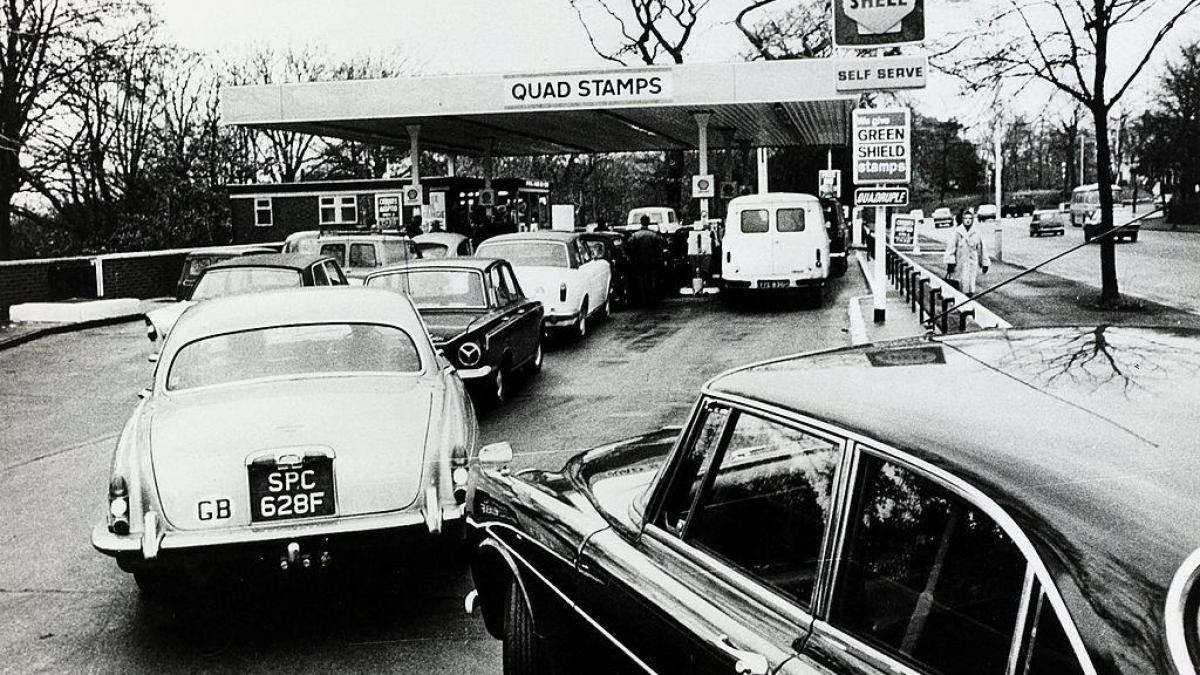The oil shock or the Arab oil embargo was a decision taken by the Arab countries to confront the Israeli tide towards Arab lands, and it targeted the United States and the countries supporting the Israeli occupation in the October 1973 war, and because of it the American economy suffered great losses, and its period extended from October 17, 1973 until March 18, 1974.
Origin and roots
The main roots of the Arab oil shock go back to the Arab-Israeli war on October 6, 1973, which took place between the Egyptian and Syrian forces on the one hand, and the Israeli occupation army on the other, and it erupted in order to restore the Arab lands occupied in 1967.
When the Syrian and Egyptian forces began striking the Israeli army and liberating the occupied Arab lands, the United States intervened and opened an immediate direct air bridge to support the occupation.
Saudi Petroleum Minister Zaki Yamani (left) with British Prime Minister Edward Heath on November 29, 1973 (Getty Images)
In the midst of this war, the American forces used the airports of European countries to transport equipment and logistical means, and then the Arab intervention began to use oil as a means of deterrence for the Americans and the Israeli allies.
Arab leaders decided to ban oil exports to the United States and countries supporting Israel on October 17, 1973, with the aim of developing a unified Arab policy on major common national issues, and putting pressure on the international community to force Israel to withdraw from the occupied Arab lands.
actors
Before the start of the Arab oil embargo and its use as a political weapon in the face of crises and wars, the concerned parties had threatened to use it as a tool to change the balance of the battle, and the Arab countries that adopted this option were Saudi Arabia, Iraq, Qatar, Algeria, Kuwait and the UAE.
However, the first actor in this crisis is Saudi Arabia, whose king, Faisal bin Abdulaziz, had promised Egyptian President Anwar Sadat an oil embargo in case the Egyptian army launched an attack against Israel.
Also, during his visit to Brazil in May 1973, Saudi Foreign Minister Omar al-Saqqaf stated that his country “feels a moral responsibility towards selling oil to those who want to buy it” and added, “If our united cause is threatened and aiding our enemy is threatened, there must be an end.”
Highlights
Before the war began, Sadat waved the possibility of resorting to the oil embargo. In early May 1973, he spoke on the occasion of Labor Day, and said that the oil-rich Arab countries, led by Saudi Arabia, promised to use the oil weapon as soon as Egypt began military operations to restore the occupied lands. 1967.
A week after the start of the war, the United States announced on October 13, 1973 the organization of an airlift to support Israel and began mobilizing financial resources to help it in the war.
As a result and confrontation of the American decision, Arab preparations began to use the oil card.
On October 16, 1973, the oil ministers of the Gulf states, members of the Organization of Petroleum Exporting Countries (OPEC) met in Kuwait, and approved a sharp increase in the price of oil, reaching 70%.
On the following day, October 17, 1973, the Arab oil ministers took a decision banning the export of oil to the United States, as well as reducing production by 5%.
After the war stopped on October 26 of the same year and negotiations began, the Arab countries kept the oil embargo.
On November 4, 1973, the Arab oil ministers, members of OPEC, met and decided to increase production cuts again by 25%, as well as expand the embargo to include the Netherlands, and it was later expanded to include Denmark, South Africa, Portugal and other countries.
On November 26, 1973, the Sixth Arab Summit Conference was held in Algeria. Among the decisions made by the leaders was to continue to use oil as a weapon in the battle, and to link the export of oil to any country with its commitment to support the just Arab cause.
On December 8, 1973, the oil ministers returned to meeting in Kuwait, and announced that the abolition of the oil embargo was linked to setting a timetable for withdrawal from the occupied Arab lands, signed by Tel Aviv and guaranteed by Washington.
On March 17, 1974, Arab oil ministers announced the end of the oil embargo after weeks of progress in talks and the disengagement between Egypt and Israel.
results and repercussions
The "oil shock" had a great impact on the reality of the global economy and changed the course of international relations, as economic interests forced Britain and France to adopt a neutral position and refused to use their airports to transport military equipment to Israel.
On November 7, 1973, the EEC foreign ministers issued a statement calling on Israel to withdraw from the occupied Arab territories.
The oil embargo caused a lot of economic losses in the United States, and the stock market lost $97 billion.
On November 1, 1973, American airlines canceled 160 daily flights to face the fuel crisis. In terms of internal transportation, car owners faced great difficulties in obtaining fuel, and large queues piled up in front of filling stations.
Because of the oil shock of 1973, the price of a barrel moved from $2.32 to $11.
Although the Arab oil embargo lasted only months, it was an effective way to deter many countries, as it enabled Arab countries to increase prices and gave them sovereignty in production and export.
And when the Arab countries that are members of the "OPEC" saw the end of the clash and the entry into negotiations paving the way for peace, they ended the oil embargo on March 18, 1974.

